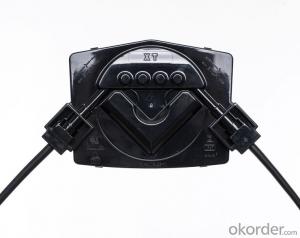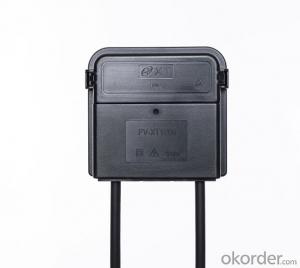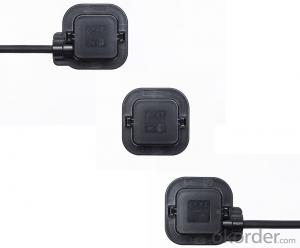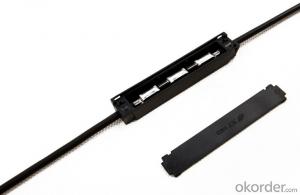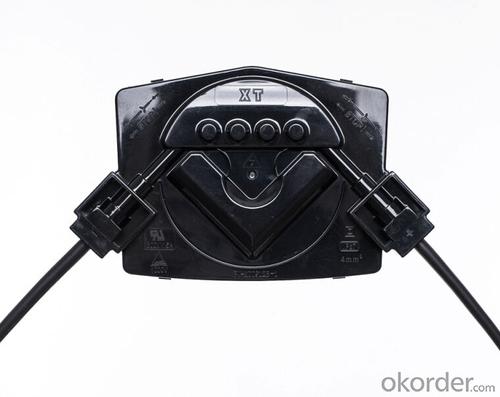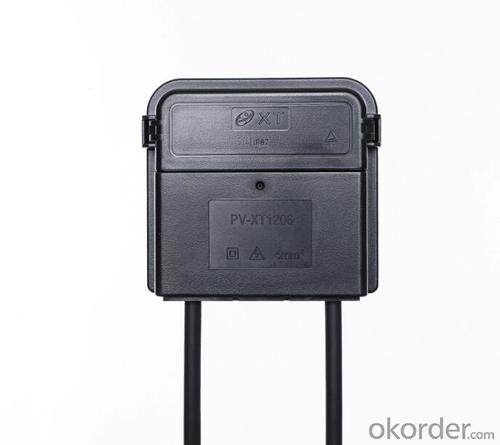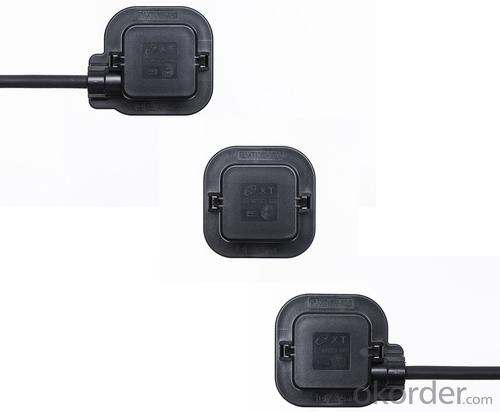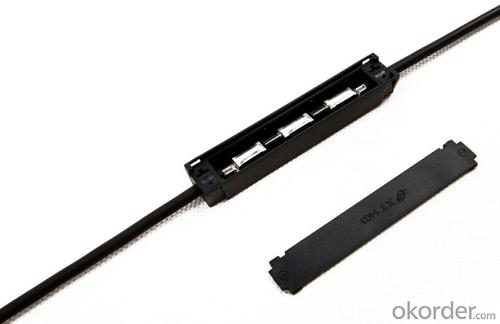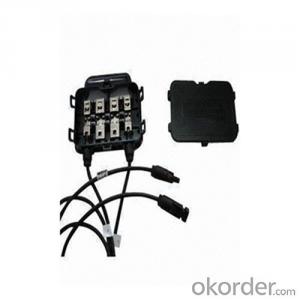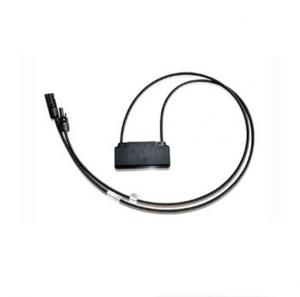Sunspot Solar Energy Systems PV Junction Box PV-0912 TÜV, UL, ISO9001 Certified
- Loading Port:
- Guangzhou
- Payment Terms:
- TT OR LC
- Min Order Qty:
- 3000 pc
- Supply Capability:
- 3000000 pc/month
OKorder Service Pledge
OKorder Financial Service
You Might Also Like
Feature
a. copper design, good heat output
b. round sealing, good waterproof
c. cover replacement, easy maintenance
d. non-glue and ultra-thin
e. double-sided contact, low contact resistance
Item Data Terminals for Ribbons 4 Rated Current 8A/12A Rated Voltage 1000V Dimension 132*98.9*18.4mm Temperature -40℃~+85℃ Size of Cables 4m㎡/12AWG Size of Ribbons W(6mm)*T(0.2mm) Protection Degree IP67 Flammability Class V-0
Product description
1. All the connection made by double fixed connection low power loss
2. With the capacity of anti-aging and resistance to ultraviolet radiation on the outer cover with excellent box design with good thermal dissipation
3. Demonstrating safe, realiable and excellent lasting functionality, applicable in harsh outdoors working ambient
4. Big variety for choices,1 rail ,2 rail,3 rail,4 rail,5 rail,6 rail.mini junction box and solar junction box for solar street light
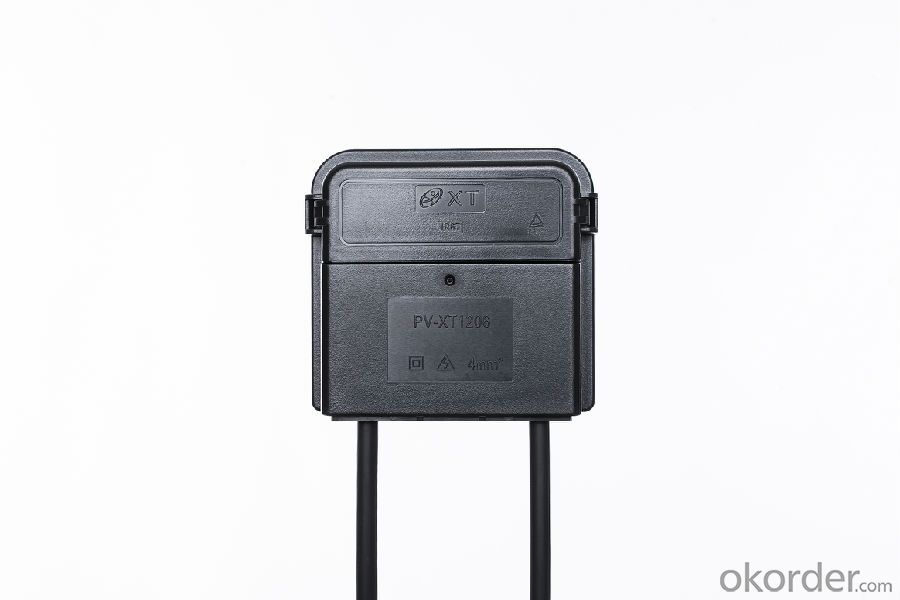
FAQ
1. How long will my inquiry get response?
Your inquiry related to our products or prices will be replied within 24 hours.
2. Can I get professional service and suggestion?
Well-trained and experienced staffs to answer all your questions in fluent English.
3. Do you accept OEM or customized design?
OEM & ODM, any your customized lightings we can help you to design and put into product.
4. What if I need specific design?
Distributorship are offered for your unique design and some our current models.
- Q: How do solar energy systems impact regional economic development?
- Solar energy systems can have a significant positive impact on regional economic development. They create jobs in the installation, maintenance, and manufacturing sectors, stimulating local economies. Additionally, solar energy reduces dependence on imported fossil fuels, thus increasing energy security and decreasing energy costs for businesses and households. This, in turn, frees up funds for investment in other sectors, fostering overall economic growth and development in the region.
- Q: Can solar energy systems be used to power an entire household?
- Yes, solar energy systems can be used to power an entire household. By installing enough solar panels, a household can generate enough electricity to meet its energy needs. Additionally, with the use of energy storage systems, excess energy can be stored and used during times when the sun is not shining. Overall, solar energy systems have the potential to provide a reliable and sustainable source of power for households.
- Q: Can solar energy systems be used in remote locations without access to the grid?
- Yes, solar energy systems can be used in remote locations without access to the grid. These systems, commonly known as off-grid solar systems, can generate electricity by harnessing energy from the sun and store it in batteries for use when needed. This makes them a reliable and sustainable solution for powering remote locations where grid connectivity is not available.
- Q: Can solar energy systems be used in powering warehouses or distribution centers?
- Solar energy systems are indeed capable of powering warehouses and distribution centers. Many businesses are increasingly adopting solar energy as a sustainable and cost-effective solution for their energy requirements. Warehouses and distribution centers, being large facilities with ample roof space, are ideal candidates for solar panel installations. By installing solar panels on the roof or ground of these facilities, the solar energy generated can be utilized to power various operations within the warehouse or distribution center. This includes lighting systems, climate control, refrigeration units, conveyor belts, and other machinery or equipment. The energy generated can also be stored in batteries for later use during cloudy days or at night. There are several advantages that make solar energy systems a perfect fit for warehouses and distribution centers. Firstly, solar power helps reduce dependence on the traditional grid, resulting in lower electricity bills and long-term cost savings. Additionally, since solar energy is a renewable and clean source, its use reduces greenhouse gas emissions and contributes to a more sustainable business operation. Besides the cost and environmental benefits, solar energy systems offer businesses energy independence and resilience. By generating their own power, warehouses and distribution centers are less susceptible to power outages or fluctuations in the grid, ensuring uninterrupted operations and minimizing downtime. In conclusion, the use of solar energy systems in powering warehouses and distribution centers offers numerous advantages, including cost savings, sustainability, energy independence, and operational resilience. Consequently, an increasing number of businesses are embracing solar energy as a reliable and efficient solution for their energy needs in these types of facilities.
- Q: Can solar energy systems be used in powering telecommunications towers?
- Yes, solar energy systems can be used to power telecommunications towers. Solar energy is a renewable source of power that harnesses the sun's energy to generate electricity. Telecommunications towers require a constant and reliable source of electricity to operate their equipment, and solar energy can provide a sustainable solution for this need. Solar panels can be installed on the tower or in the vicinity to capture sunlight and convert it into electricity. This energy can then be stored in batteries for use during periods of low sunlight or at night. In remote or off-grid locations where access to the electrical grid is difficult or expensive, solar energy systems can be particularly beneficial for powering telecommunications towers. Additionally, solar power reduces dependence on fossil fuels, decreases carbon emissions, and lowers operating costs in the long run. Overall, solar energy systems offer a viable and eco-friendly option for powering telecommunications towers.
- Q: Are there any risks of electrical shocks during installation or maintenance of solar energy systems?
- During the installation or maintenance of solar energy systems, one must be aware of the risks of electrical shocks. These systems involve working with electrical components, such as solar panels, inverters, and batteries, which carry high voltage. Failure to follow proper safety measures can result in contact with live electrical parts and the possibility of receiving an electrical shock. Several factors can contribute to the risk of electrical shocks, including improper installation, insufficient knowledge or training in electrical systems, failure to use personal protective equipment (PPE), and inadequate grounding. It is crucial to adhere to safety guidelines and regulations when installing or maintaining solar energy systems. This includes wearing insulated gloves, using insulated tools, and ensuring proper grounding. Furthermore, working at heights during installation or maintenance introduces an additional hazard of electrical shocks. Care must be taken to prevent falls or accidental contact with live electrical parts while working on rooftops or elevated areas. To minimize the risks of electrical shocks, it is advisable to hire qualified and trained professionals for the installation and maintenance of solar energy systems. Regular inspections and maintenance checks should also be conducted to identify and address any potential electrical hazards. In conclusion, while solar energy systems offer many benefits, it is vital to be aware of the potential risks of electrical shocks and take the necessary precautions to ensure the safety of individuals involved in the installation or maintenance process.
- Q: Are there any health benefits associated with using solar energy?
- Yes, there are numerous health benefits associated with using solar energy. Solar power is a clean and renewable source of energy that reduces reliance on fossil fuels, thus reducing air pollution and greenhouse gas emissions. This improves air quality and lowers the risk of respiratory and cardiovascular diseases. Additionally, solar energy systems do not produce harmful emissions or noise pollution, contributing to a healthier and quieter environment.
- Q: Can a solar energy system be used in areas with high levels of air pollution?
- Indeed, areas with high levels of air pollution can still utilize solar energy systems. Although the efficiency of solar panels may be diminished by air pollution, it does not completely impede their ability to generate electricity. In polluted regions, solar energy systems continue to operate and produce power. It is worth mentioning, however, that the system's efficiency may be slightly reduced due to the decreased amount of sunlight reaching the panels. Regular cleaning and maintenance of the solar panels can help alleviate the impact of air pollution on their performance. Furthermore, advancements in solar technology are being pursued to enhance panel efficiency in polluted environments. For instance, anti-soiling coatings are being developed to prevent dust and pollutants from adhering to the panels. Overall, even in areas with substantial air pollution, solar energy systems remain a feasible and sustainable source of electricity.
- Q: Can solar energy systems be installed on roofs?
- Solar energy systems can indeed be placed on roofs. In fact, rooftops are a popular choice for solar panel installations. One key benefit of installing solar panels on roofs is that they make use of existing space, eliminating the need for extra land. Moreover, rooftop solar installations offer the advantage of being unimpeded by shade caused by trees or buildings, maximizing sun exposure and electricity generation. Additionally, rooftop installations often prove cost-effective, as they reduce the requirement for long-distance transmission lines and directly supply power to the building. All in all, installing solar energy systems on roofs is a pragmatic and effective means of harnessing clean, renewable energy.
- Q: Are there any tax credits available for solar energy systems?
- Yes, there are tax credits available for solar energy systems. The federal government offers a federal solar investment tax credit (ITC) that allows homeowners and businesses to deduct a percentage of the installation cost of a solar energy system from their federal taxes. Additionally, some states, local governments, and utility companies may also offer their own tax incentives for solar energy systems.
Send your message to us
Sunspot Solar Energy Systems PV Junction Box PV-0912 TÜV, UL, ISO9001 Certified
- Loading Port:
- Guangzhou
- Payment Terms:
- TT OR LC
- Min Order Qty:
- 3000 pc
- Supply Capability:
- 3000000 pc/month
OKorder Service Pledge
OKorder Financial Service
Similar products
Hot products
Hot Searches
Related keywords
